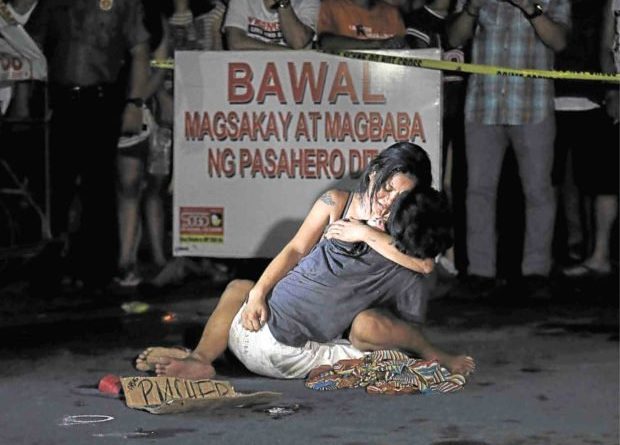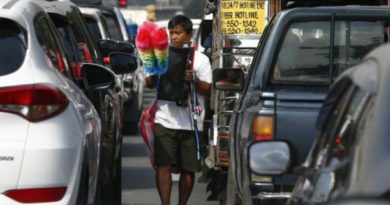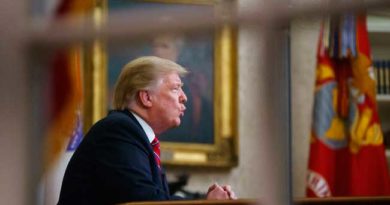HEADLINE: DU30 DRUG WAR-EJK: MANILA Philippines- Duterte will not cooperate with ICC drug war probe
.

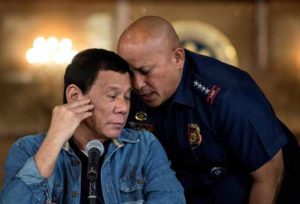
MANILA (AFP) – President Rodrigo Duterte will not cooperate with the International Criminal Court’s (ICC) probe into the Philippines’ drug war, his lawyer said, after its judges found the crackdown could be a crime against humanity. More details in Friday’s Borneo Bulletin.
.
Duterte admin unfazed by ICC probe, won’t cooperate — Palace
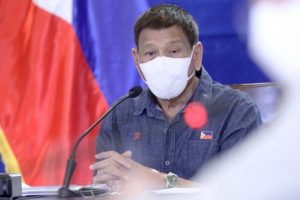
.
MANILA, Philippines (Update 2, 6:31 p.m.) — Malacañang won’t cooperate with the International Criminal Court’s (ICC) probe on President Rodrigo Duterte’s bloody war on illegal drugs and is confident that the case will just languish because investigators won’t find evidence that will back the complainants’ allegations.
An ICC pre-trial chamber has approved the conduct of an investigation on the complaints filed against Duterte, saying the crime against humanity of
murder “appears to have been committed” and that potential cases arising from the probe appear to fall within the court’s jurisdiction.
The chamber said it has found “reasonable basis” to proceed with an investigation because the specific legal element of the crime against humanity of murder under the Rome Statute – the treaty that formed the ICC – has been met. It cited the killings that took place in various parts of the country between July 1, 2016 and March 16, 2019 in the context of the drug war and the deaths in the Davao area between Nov. 1, 2011 to June 30, 2016.
According to the chamber, the available material indicates that “a widespread and systematic attack against the civilian population took place pursuant to or in furtherance of a state policy.”
Presidential spokesman Harry Roque said Duterte was unfazed by the chamber’s decision and insisted that the ICC has no jurisdiction over the drug war.
“The president has no reaction because from the start, he said he would die first before he faces foreign judges,” Roque said at a press briefing Thursday.
“If there are complaints, it should be filed in the Philippines because the courts are functioning. The ICC has no jurisdiction and it can only act on cases if the courts are not functioning or if they are unwilling to have jurisdiction over offenses punishable not just by the Rome Statute but also by the laws of the Philippines,” he added.
Chief Presidential Legal Counsel Salvador Panelo said the ICC never had jurisdiction over the Philippines, echoing the claim that the treaty did not take effect because it was not published in the Official Gazette.
“We have repeatedly emphasized that the Rome Statute, being penal in nature, failed to comply with the publication requirement that affords due process to those which it seeks to affect. It is as if the said instrument never took effect in the country,” Panelo said in a statement.
“Hence, the development that a pre-trial chamber of the ICC has authorized an investigation into alleged crimes committed in our territory neither bothers nor troubles the president and his administration,” he added.
Sovereignty
Roque claimed that a participation in the ICC investigation would be “a violation of our sovereignty and our jurisdiction.”
“Our consent to be a member did not mean that we waived our sovereignty and jurisdiction. Sovereignty is very important. Jurisdiction is an aspect of sovereignty and it’s about the hearing of cases and crafting of laws,” he said.
“We did not waive our sovereignty when we became a member of the ICC because we said we would agree with an ICC jurisdiction if the local courts are not functioning.”
The Philippines ratified the Rome Statute in 2011 but Duterte withdrew the ratification seven years later after the ICC announced that it would conduct a preliminary examination on his narcotics crackdown. The country’s withdrawal from the statute took effect in March 2019.
Critics of the controversial campaign, which has left more than 6,000 drug suspects dead, claim that it encouraged human rights violations but officials deny this. The pre-trial chamber’s decision to allow the probe was in response to the request of former ICC chief prosecutor Fatou Bensouda for authority to investigate the anti-drug campaign. Officials have claimed that Bensouda’s conclusion about the drug was only based on “hearsay.”
‘How will they find evidence?’
Roque said under the ICC’s system, prosecutors are the ones who are gathering evidence that would prove the allegations of complainants. He said prosecutors are not likely to find evidence if authorities do not cooperate with their probe.
“The problem is if we are no longer a member (of ICC) and there is no duty to cooperate, how will they find evidence? When investigating a killing, you need a police report. How will they do it if the police do not cooperate or provide the police report? People who conducted the autopsy won’t cooperate as well,” the Palace spokesman said.
“So, ang aking prediksyon po, matutulog lang po iyang kasong iyan dahil in the absence of cooperation, lalung-lalo na sa kapulisan eh wala po talagang ebidensiya na makakalap (My prediction is the case will just languish because in the absence of cooperation, especially of the police, no evidence will be gathered),” he added.
Roque said an ICC pre-trial chamber previously said that the prosecutor should not continue with a probe if the parties involved are not cooperating because it would not lead to a successful prosecution. He noted that an appellate tribunal has reversed the decision so it would now be up to the prosecutor to decide whether a probe should be conducted.
“But what I am saying is I believe that the decision of the pre-trial chamber is correct. If you are an expert of criminal prosecution and litigation, if you do not have evidence, there would be no case. If there is no cooperation, there is no case because you can’t present evidence before the court,” he added.
When asked to react to the ICC pre-trial chamber’s statement that Philippine authorities have failed to take meaningful steps to investigate or prosecute the killings, Roque said delays in the resolution of cases are not unique to the Philippines.
“The delay is a problem not only in the Philippines but also in the ICC. Did you know that the preliminary examination against England on the alleged war crimes committed in Afghanistan took ten years?” Roque said.
“So if the accused are from developed countries who are whites, the decision would take ten years and the decision is not to continue the preliminary investigation. But if it involves non-developed countries like the Philippines, the resolution is fast,” he added.
‘Political apparatus’
Panelo claimed the timing of the ICC’s decision revealed that the court is “bent on proceeding with a case against our government officials in violation of our Constitution and in contravention with the Rome Statute that created it.”
“It also reveals that the ICC is being utilized as a political and propaganda apparatus by those usual suspects who will do anything to dethrone the President from his seat. No wonder the leading and powerful countries of the world have either not joined it or have withdrawn their membership therefrom,” Duterte’s chief legal counsel said.
Panelo also suspects that the development is related to the upcoming elections. Duterte has announced that he is running for vice president next year.
“While we expect that more theatrics will be employed by the detractors of the President as election season draws near, this blatant and brazen interference and assault on our sovereignty as an independent country by the ICC is condemnable,” Panelo said.
“We stress that we are able and willing to prosecute those who abuse their power and commit crimes against the citizenry if only genuine complainants come forward to the proper authorities instead of personalities who will use their plight for political ambitions,” he added.

